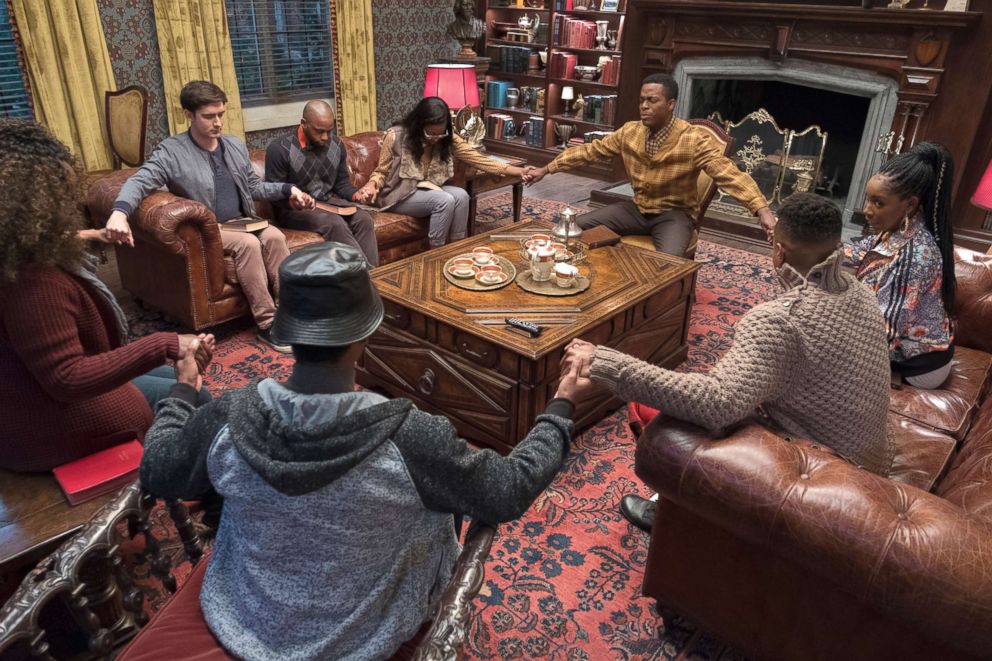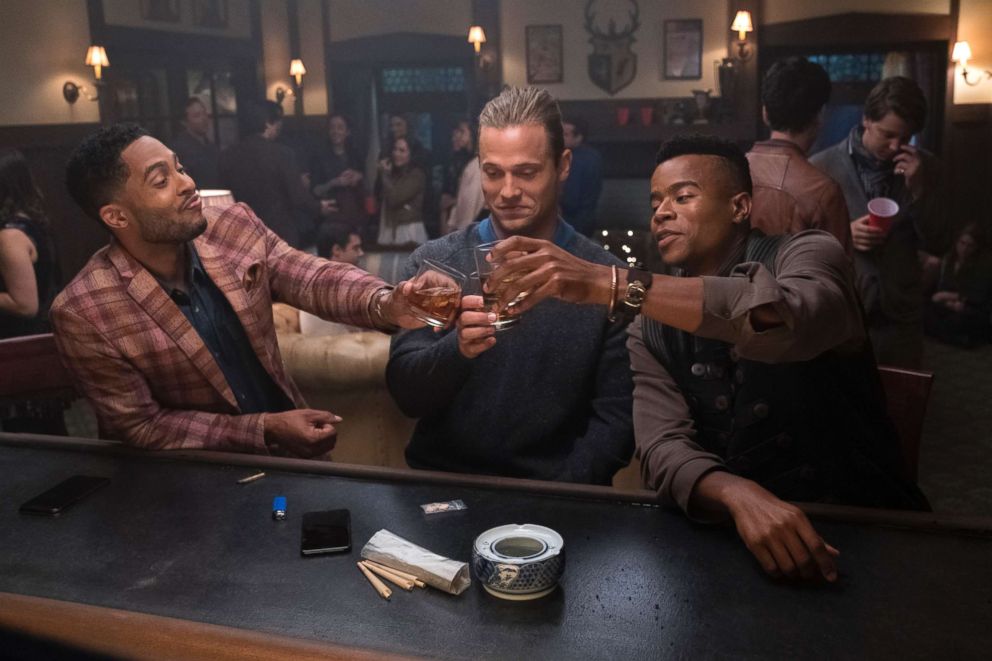'Dear White People' creator on 'giving voice' to stories mirroring real life
“It's made the series a bit more urgent,” the writer-director told “Nightline.”
The national conversation about race seems to fade when the camera stops. Justin Simien is exploring that conversation, looking at black identity through the lens of his Netflix show, “Dear White People.”
The show unpacks big and sometimes provocative themes including racial bias in law enforcement, sexual orientation in the black community, white privilege and interracial relationships.
“The title is a misnomer,” Simien said. “It's called ‘Dear White People,’ but it's really about being black. And it's really about the fact that blackness sometimes feels like a constant response to white people. Like you're always having to explain yourself.”
The series is set on a fictional predominantly white Ivy League college campus, Winchester University, that Simien calls a “stand-in for America.”
“The Ivy League world gives me a lot of interesting things to play with, and sort of comment on the American experience within this little microcosm,” he said.
And this second season is particularly timely in a Trump America, Simien said.
“I think for me it's made the series a bit more urgent,” he said. “Not because these issues are brand new to us…. But now folks … are urgently trying to figure out, ‘Well, what happened?’ And black folks are like, ‘Wel,l actually, we've been bringing this up for some time. Now that you're all ears, let's talk about it.’”
Six of the show’s characters told “Nightline” that they’re not just playing a role, but personifying an important narrative for viewers.
“I'm grateful that we're on a show that can allow kids, or whoever, to really have a place to kind of explore different views or feel like they can attach to a character,” Ashley Blaine Featherson, who plays Joelle Brooks, said.
Her co-star Logan Browning plays one of the main characters, Sam White. Part provocateur, Sam wields her influence through her radio show.
“At the surface, she is a biracial woman who is on this campus with racial tensions. And she wants to … give voice to the people on campus who aren't heard as much,” Browning said.

Another character Coco Conners, played by Antoinette Robinson, is first introduced through Sam’s perspective and seems to be Sam’s antagonist.
“Coco believes that infiltrating the system is the best way to get to go about getting change, not raging against the machine, but finding a way to climb the corporate ladder [and] find success within a world of whiteness,” Robinson said. “She's very much so aware of the world and how it perceives women of color.”
Simien says he intentionally gave voice to multiple perspectives through the lens of the various characters.
“My show sort of shifts points of views each episode,” he explained. “When you're with Coco, from Coco's point of view, all of a sudden you see this full woman ... nobody is sort of presented to you in just one way.”
At times, the show holds up a mirror that exposes the divides and complexities within the black community. Sam’s character becomes even more complex when viewers learn that she’s dating her white teaching assistant, Gabe Mitchell, played by John Patrick Amedori.
“He'll never understand what it's like to be in her shoes. But he really wants to understand,” Amedori said. “And I think Sam sees that in him and knows that it's genuine.”
Simien said, “Part of what I'm exploring with Sam's relationship with Gabe is how this sort of the construct of race” can get “in between us being human beings and communicating with each other.”
“Somebody who is prominent in the black community, is outspoken, is an activist, you find out they have a white wife, or a white husband, ‘Aww.’ You know what I mean?” he continued. “Listen, I'm on the other side, because I have a white bae … but I get it because when you feel like everything that you are is under attack, it just feels like another version of that attack.”
While Sam and Gabe’s relationship proves tumultuous at times due to both personal and social issues, Amedori said, “They get to a point where they become really, truly broken down, honest and vulnerable with each other.”
Simien explained that for some prominent people in the black community with a white significant other, things can feel tricky. “I'm on the other side, 'cause I have a white bae. OK?” he said laughing. “But I -- I get it because when you feel like everything that you are is under attack, you know, it just feels like another version of that attack.”
He added that with Sam and Gabe’s relationship “this sort of construct of race really just gets in between us being human beings and communicating with each other.”
While their relationship proves tumultuous at times due to personal and social issues, Amedori said, “They get to a point where they become really, truly broken down, honest and vulnerable with each other.”
In one particular scene in season two, “White allyship” as Browning calls it, is brought up and her character calls Gabe out for “the white savior complex,” Amedori said.
“The conversation between Sam and Gabe is almost like the conversation I feel like we all want to just have. But we're on Twitter, or we're on Facebook,” Simien said. “These places where ... it’s about being right, it's not about being heard.”
Simien said of the scene, “We just let them have it out for a half hour … this is what this conversation could be if we learned to stay in the room together long enough to hear each other.”
Amedori said being a part of “Dear White People” has been “really educational” for him, and at times “it really punches you in the face.”
Art mimicking life is a reoccurring theme on the show. Our national conversation is flooded with social media videos of encounters of black people with police.
“Every time I see a video of a [black] kid that looks just like me -- who was just at the wrong place at the wrong time, being brutally murdered, or taken into custody, that is traumatic. That is traumatic to me,” Simien said. “It just felt like we had a responsibility to speak to that.”
Season one tackled a scene where a campus police officer draws a gun on a black student named Reggie Green, played by Marque Richardson, after the cops were called to calm a fight at a party.
“Black comes at you real fast sometimes. And Reggie is literally having a near death experience over being at a party, and doing the same things that everybody else is doing,” Simien said of the intense moment.
“When I read the script you know, it didn't hit me until like hours later,” Richardson said. “And I just, you know, cried. And every time I thought about it, I just continued to cry.”

Reggie’s narrative explores the collateral damage of a moment and how trauma often lingers long after the headlines disappear.
“The happy ending of Reggie not dying that night, still comes with a lot of consequences, comes with a lot of wounds,” Simien said. “Most television shows, when something like that happens -- we're done. We might reference it a couple times in the dialogue, but we're done. But for black folks, we're experiencing PTSD.”
Simien makes that point by revisiting Reggie’s pain throughout the series, focusing on mental health.
“I think part of why mental health is a taboo in the black community is because -- we're all kind of in survival mode. We've been in survival mode for generations now,” he said. “It's very difficult to acknowledge pain ... but we have to.”
Self-care for the actors and the characters they play on screen was a reoccurring theme in our conversations with them.
"I hope that particularly people of color -- can come to realize just how important and how beneficial therapy can really be to one's life, " said Featherson. "Having someone -- you know, an unbiased third party, somebody to talk to about your issues can really -- it can save lives.”
The team behind “Dear White People” believe that lifting up a truth, a shared experience, can lead to a more empathetic society, where everyone is seen and heard.
“Something Justin said to me before we even started filming the show is that playing this character … might change somebody's life, or save somebody's life. That's what he said to me a lot, ‘Save,’ said DeRon Horton, who plays Lionel Higgins.
Simien said there are times when he and his staff will be researching in the writers’ room, and he discovers history and stories they’re uncovering that leave a profound impact on him.
“I'll find myself alone, and I'll just start to weep,” he admitted. “Because of all of the people that didn't have an opportunity that I have to give voice to these experiences. I mean, there are people who have lost their lives for saying far more innocent things than ‘Dear White People.’
“The fact that I have the opportunity to say something and tell people what I'm going through is not lost on me,” Simien added. “I feel like I have to say something in my work.”




